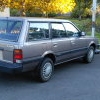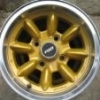Search the Community
Showing results for tags 'intake'.
-
I am in the middle of a carb swap from a carter-weber to a hitachi and I just got the new intake in but the vacuum line cp (hard vacuum lines under intake) are different. not sure what to connect to what. curious if anyone has a diagram or information. thanks
- 3 replies
-
- carter-weber
- hitachi
-
(and 4 more)
Tagged with:
-
I am trying to solve coolant leaks on the passenger side head of a 93 Loyale. Before dismantling, I saw coolant on the top of the head from the intake gasket when I pressurized to cooling system - engine off. There was also coolant coming out (slowly) from the rear cylinder exhaust port. It had leaked into and around the exhaust pipe rusting the bolts. Now I have pulled the head looking for issues inside. The head gasket looks fine but the top row of head bolts are rusty. Probably from the intake leak on the top of the head. Anything else to look for? I hope the head isn't cracked. Could the intake leak cause all this? (I'll try to attach pictures or link to my gallery) This is a JDM engine. The EGR pipe routes to a cannister that isn't connected to anything on the other side (just plugged). Is that the best thing to do?
- 12 replies
-
- Loyale
- coolant leak
-
(and 1 more)
Tagged with:
-
So first post and all, gonna try my best to not step on too many toes, thus I apologize in advance for any faux pas. Well to start I’ll state that this wagon has sat for well over 10 years, had water in the cooling system, gas left in the fuel lines, and amongst myriads of problems not been run or driven. Amongst these issues are that the blower doesn’t work, kinda, and I don’t have heat or A/C, well, till today. I just started the wagon as usual, except the rpms which normally idle at 1200-1400 (trying to figure this out too) dropped to 500 and there was a loud click from within the dash and suddenly the blower motor turned on. Interestingly it doesn’t turn after this first time. More so, whilst it was running I was estatic to find that the heater core was good and I was able to get heat, along with all 4 fan speeds. Fast forward 7hours. I went for lunch and upon starting the car for the first time after the blower suddenly worked, it no longer does. And after getting food and coming up to the wagon there is a large pool of coolant under it, figures... After returning from lunch I open my hood to find coolant sprayed across nearly everything. The source is, so far as I can discern, the manifold that connects to the heater core is spraying a jet of coolant onto the torque converter, thus spraying it across the engine bay and creating the large pool of fluid.For more specifics refer to pictures. Also as of taking these photos it has become twice as bad, rather 2 jets instead of 1. What I cannot figure out is threefold: 1- what part this actually is, as the number is covered by the intake, thus I cannot search it 2- if it’s removable without too much headache 3- why the blower motor suddenly works after 3 months and then just as suddenly doesn’t, yet the heater and A/C controls after an equal amount of time not working, are still working
-
1992 Loyale with 187K I poured water into the intake port on the head and found out that three valves leak. I am going to rent a valves spring compressor and address that. Should I do the fourth one? When I poured water into the exhaust port there were no leaking exhaust valves. Why? Should I do them too? I have never done that kind of work so any suggestions/recommendations will be greatly appreciated. Thanks, Sam
-
INCREASE FUEL MILEAGE DECREASE EMISSIONS IMPROVE PERFORMANCE $49.95-$54.95 Check out our fitment guide on our website www.crawfordperformance.com Increase fuel economy and power as much as +8% in minutes with the patented Eco-Block from Crawford Performance. - Installation is simple and requires only a screwdriver - Increase fuel mileage, decrease exhaust emissions, and provide an improvement in power delivery - Satisfaction is guaranteed: If you aren't satisfied, simply return the Eco-Block for your money back.* Familiar with a cold air intake? Those increase the volume of the intake, subsequently pulling the sensor out of the air stream. The Eco-Block does the same exact thing, but does so by utilizing a spacer to pull the sensor out of the air stream. The benefits you receive with the Eco-Block vs. a cold air intake: - A fraction of the price: $50 vs. hundreds. - Maintains smaller intake volume, maintaining air velocity. The larger volume from an aftermarket cold air intake slows the air down, creating lag. - Keeps the stock air box / intake in place, which keeps your car smog legal and warranty safe. - Does not require a tune to maximize it's performance.
- 2 replies
-
- Fuel mileage
- Performance
-
(and 2 more)
Tagged with:
-
I have been marooned for months now, living by my wits, doing evertything to save my Subaru Brat and my practical life. I have now succeeded in getting carb rebuilt, replacing water pump & almost a dozen gaskets, and other parts/ewprk/etc. Same problem persists.| Some months ago mechanic rebuilt carb, used two carb gaskets instead of one, after that water was spewing into carb, blew out whole water/coolant stystem, caused all kinds of problems. It has been HELL, and any other engine, I could not have got this far. Got it barely/technically running, was able to come into town, gtet supplies and to use wifi and post this. Not sure when I willo be able to c heck this post/thread/etc again, maybe tomorrow or soon, depending on all too many things. How is water still going into my carburetor?!? How can I stop it? Engine runs, very hard to start, for potentially obvious reasons. I suspect something wrong where the intakje manifold is concerned. There is a small coolant hose, about the size of a fuel line in diameter, going from one part of the manifold to another ver near each other near the distributor. Could that be it? Can I plug them up without causing serious danger or problems for engine? I have to stop this water from coming into my carb!!! Help ?!?!?
-
Hello all! I am posting because I'm trying to figure out exactly what is going on with my engine in my Loyale. For a while now, I have been having oil in my air box and intake snorkel. I have done a lot of work on this engine already, and with a baby on the way, I need it more reliable than ever. I'm due for a tune-up, but I don't want to spend money on an air filter and spark plugs when they're just going to get ruined again. Here's my issue: I have oil coming into my air box, and a pretty decent amount at that too. The whole bottom half of my air filter is covered in oil, with it puddling up at the bottom. The whole rubber intake snorkel going to the throttle body is coated with oil on the inside, pooling up in the grooves of it. My throttle body and inside my intake manifold remain clean, however. When I engine brake down long hills is when it seems to be happening, since when I get to the bottom of the hill and touch the gas, I get a cloud of blue smoke out the exhaust (temporarily), oil burning smell, the engine hesitates, and then goes back to normal when the oil is burned off. Going up hills and normal flat driving don't yield any abnormalities, and I can't see any blue smoke out the exhaust (from the rear view mirror). First things first, I took care of the obvious. Replaced the PCV valve with a genuine Subaru one and replaced all the PCV hoses. The T connections are free and clear, and I even have the updated design with the blue T fitting, and it's installed properly (don't have the T fittings switched around). I also have taken care of just about every single vacuum line in the engine bay since most were hard and cracking. When I replaced everything, the problem still continued, though arguable it got a little better, just a little. So the mystery is why is it still doing this? Just the other day I removed all the lines and PCV valve, made sure where the PCV valve goes into the intake manifold is free and clear. I have cleaned all the hoses and air box, but after just a drive or two, it goes back to the condition it's in now. Oil in the air box and intake snorkel, oil coated PCV lines lined on the inside with milky residue, similar to what you would find on an oil cap on an engine with head gasket issues. I presume this is just condensation, and it's worth noting that the oil cap has been replaced (it doesn't rattle; it seals properly) and it has no milky residue whatsoever. The oil in my air box becomes so much that it leaks out the bottom, spilling oil on my frame rail right underneath the air filter and eventually going onto the ground. What is this telling me? With all the basics covered and what all my extensive research has yielded, one can simply pass this off as blow-by. This doesn't make me a happy camper because again, I have a baby on the way so I can't have things like leaking piston rings. I had the piston rings go out on my old Loyale and I don't want to deal with that after the baby is born, so I'm trying to take care of things ASAP and fix everything properly, so my car is the last of my worries and I can focus my attention on the baby. So let's get into further diagnostics! I have a vacuum gauge hooked up in my car, and it reads perfectly. Like, I have not seen a vacuum gauge give more ideal readings on an engine. At idle when warmed up, it sits beautifully at around 22-23", like it should. The vacuum gauge is very responsive to throttle inputs and never fluctuates or crazy needle vibrations (my old Loyale had erratic readings on the vacuum gauge, indicating piston ring issues, and sure enough they went out on me). So according to the vacuum gauge, my engine is in good shape, at least the bottom end is. Today I did a compression test on the engine to see if it would yield any interesting results, and sure enough it did. The two cylinders on the passenger side of the engine (2 & 4) came out both at exactly 120 psi. However, the two cylinders on the driver's side (1 & 3) came out to exactly 60 psi. Obviously something is going on with that side of the engine. First idea for this would be my exhaust leak. The exhaust studs on that driver side cylinder head are completely messed up. When I bought the car, one exhaust stud was missing and the hole was oversized. Last time I had the engine out, the other stud decided to break off in the block. With careful attention to detail and help from coworkers at the shop I was working at, the best I could do was drill a hole in the broken stud, but we kept breaking drill bits because it was so hardened. Currently, the exhaust is barely being held on on that head, but it's sketchy to say the least. Bottom line, if I unbolt the exhaust, I don't know if I'll be able to get it to tighten again. I need a new cylinder head on that side to fix the problem, but I've been putting it off since I don't want to deal with all that work. So I have a minor exhaust leak from the bottom of that cylinder head (as well as a muffler about to fall off, getting a new one next paycheck though), and I'm not sure if that would affect compression test results but it is worth noting. My question is, where do I go from here? Obviously my next step is a leak down test, but it might be a short while before I can get my hands on a leak down tester and air compressor (might be able to do it at the shop I work at, but finding time is hard). So I'm looking for some advice as to what it might be. I am more than happy to throw "new" (used, but machined) heads on the engine and do the head gaskets, but if it's the piston rings, I'd be looking at changing out the long block since I don't have the tools or extra money to rebuild the block. I would much, much, much rather do the head gaskets. It'd be nice to know that they've been done and I've got a lot of new parts on this engine (replaced just about every oil seal/gasket, brand new lifters, timing belts, etc.) so it would already make the job that much easier/cheaper. Oh yeah, last thing to mention is oil and coolant consumption. I do not lose any coolant, as the coolant level in both the radiator and the overflow reservoir stay steady and topped off. However, even after replacing all the oil leaks, I do lose oil. About 1 quart every 1800 miles or so. Usually by the time I do my oil change at 3000, I have had to add about a quart and a half. Sometimes a little more, sometimes a little less. If it's blow-by, that means my rings are shot, yeah? If that's the case, then why is my vacuum gauge reading perfectly fine? Even if it was my valves having issues, that would be obvious on the vacuum gauge. So assuming the gauge is telling me the right things, then that means that I'll be needing to do the head gaskets and throw on some rebuilt heads with good valves and seals. But if THAT is the case, why is oil getting into my PCV and intake? The only thing I can think of is the valve seals letting oil in or something, but again, I feel like I would notice that on the vacuum gauge. Now I've never done a head gasket job before so I could be ignorant about small details inside the head that can cause things like this, but it's not outside my realm of what I can do/learn. Would the exhaust leak on that cylinder head affect compression reading? Would I fix the compression by replacing the head and fixing the exhaust? If so, how/why would that affect the oil getting in my intake? Any help is appreciated, even if it's just spit balling an idea. The baby is due in July and I'm trying to get this thing running like a top by the beginning of summer so I don't have to worry about my car. I could, and might, install an oil catch can just to ease the stress on the engine, but like I said, I like to get things done properly instead of just bypassing the issue. Thank you so much for reading all of this, I know it was a lot. I just try and give as many details as I can. I work as a technician and I know the smallest details can affect diagnostics a lot. Grant
-
Hello all, I'm new to this forum. I have owned my 89 XT GL for about a year now with minor problems but overall satisfied. I am having a hard time locating any kind of parts for this thing and was hoping to get some knowledge from you guys. First is there any short or cold air intakes made to fit for the 1.8l? 2nd, has anyone fabricated a short ram themselves. i was thinking i could fab something up to relocate the MAF closer to the manifold and then just put a short pipe and cone filter on the end of it to free up some of that engine noise i love so much. I'm just trying to get ideas of how i want to go about it. I'm not kidding myself i'm not trying to make this thing go fast because nothing short of a swap to the turbo 6 would do that lol. I've already put a subtle performance muffler on the back and I'm just trying to get the front to match in sound. any help of comments are appreciated.
-
Hello all, I'm new to this forum. I have owned my 89 XT GL for about a year now with minor problems but overall satisfied. I am having a hard time locating any kind of parts for this thing and was hoping to get some knowledge from you guys. First is there any short or cold air intakes made to fit for the 1.8l? 2nd, has anyone fabricated a short ram themselves. i was thinking i could fab something up to relocate the MAF closer to the manifold and then just put a short pipe and cone filter on the end of it to free up some of that engine noise i love so much. I'm just trying to get ideas of how i want to go about it. I'm not kidding myself i'm not trying to make this thing go fast because nothing short of a swap to the turbo 6 would do that lol. I've already put a subtle performance muffler on the back and I'm just trying to get the front to match in sound. any help of comments are appreciated.
-
Attention all turbocharged EA owners! This thread is to gauge the interest in an aftermarket replacement for your MAF-to-turbo hose. As you probably have experienced owning an older Subaru, many critical parts are no longer available (NLA), including the inlet hose on our EA81T and EA82T engines. This particular rubber hose happens to be out of production and is installed in a location that sees a lot of heat. I found the pipe on my personal vehicle had split where it joins the turbocharger's inlet and once I found out I couldn't order a replacement, I reached out to a few companies about building a replacement. The details: Replacement hose made from silicone Molded to match the contours of the OEM part Nylon reinforced for rigidity Lined with fluorosilicone to resist damage from PCV oil mist Resists degradation in temperatures up to ~500*F (EPDM rubber is good to ~210*F) CARB legal There is also an opportunity to have replacements made for all the other molded rubber PCV/vacuum hoses that are currently out of production. At this point I have a rough idea of what it will take to manufacture this part. Price will depend on how many parts are made, so this thread is for me to get an idea of how many folks here would be interested in one of these hoses. There are still a lot of variables to work out, but I'm open to comments and suggestions. So, who's interested?
-
Greetings everyone: My first post, here goes: Background on the Car: 1984 Subaru 155K miles. I bought this car not running. I don't know much of the history other than it hasn't been on the road since 2002. The previous owner parked it because it stopped running. After inspecting the motor and pulling the plugs, I found coolant in all four cylinder heads; intially, I thought that the motor had blown head gaskets- but then after reading several posts on USMB, it got me thinking the intake manifold gaskets were bad. This would explain why I had coolant in all four cylinders. So, I went ahead and pulled the intake manifold last weekend- and, to my surprise, found the passenger side coolant passage completely blocked with this white waxy/pasty gunk. I have no idea what this substance was, it reminded me of Elmer's Glue white paste. The blockage was about 1" thick. The only thing I can think of is that the previous owner added "Head Gasket Sealent" attempting to seal the coolant leak that was getting into the heads and the stuff sealed up the intake coolant port. So, I cleaned this blockage out the best I could using the head of a flat head screw driver and flushed the coolant ports out with water. I just finished cleaning the intake manifold mating surfaces in preperation for the new gaskets. I have also replaced the thermostat and thermostat gasket while the intake is off. My question is: Since the intake is already off, should I replace the head gaskets as well? I'm worried that after putting the new intake gaskets on, I'll find out that the head gaskets are bad and have to replace the intake gaskets twice (cleaning those mating surfaces was not fun and I would hate to do it twice!). If I don't pull the heads and just replace the intake gaskets, how should I go about getting the coolant out of the cylinder heads? When I turn the motor over with a wrench I can see coolant in the intake port as well as see pooling coolant looking through the spark plug hole. Should I consider flushing out the clyinder heads, then sucking out the water and coolant with a pump? Check out this pictures I took of the gaskets and unkown blockage substance: http://www.dropbox.com/sh/nnwoarop3cy5g3v/AAB1IrYALGDwwEL3_-LZv3gVa?dl=0 I would really appreciate any advice people have.
- 14 replies
-
- EA81
- Head Gasket
-
(and 1 more)
Tagged with:
-
OKAY, I knew my intake was a little warped when I put it on,so I used two gaskets on each side and Indian Head shellac............AND.............IT leaked....I have decided to fix it,so I took it off and have two options since I cant find one anywhere (My local Knoxville Tn Pull a part has none for a long time now)...Option 1) : buy a piece of granite or marble and glue sandpaper to it and SELF MILL it ...OR Option 2) MACHINE SHOP....AND THEY ARE Pricey......so far 70-120 $... Any Ideas? Anyone have one to sell ? It's not warped ALOT in my opinion, but it does rock front to back on a flat surface... I just want it to be right and NOT LEAK.. THANKS FOR ANY HELP
-
Anybody have any information on this ea81 intake? I've never seen an ea81 intake that looks like it before. Any info is appreciated.
-
I picked up a Brat in Washington a few months ago for a song. It's a real fun car, but something is wrong. when i give it gas it shudders and seems as though its gulping. it doesnt like to get to highway speed and I have even noticed that taking my foot off the gas slightly makes it accelerate faster. its runs particularly rough in the cold and in the rain. thoughts?
- 11 replies
-
- carburetor
- intake
-
(and 1 more)
Tagged with:
-
Hey all. I have been looking at upgrading my intake and would love to try to go with a Ganza style pipe. Problem is I have a MAF sensor on my 99 OBS. I currently have a Spectre drop in filter and second filter in my torque box so it doesnt have an air leak. Does anyone know if I could fab something up to locate the MAF between the torque box and TB? I wasn't sure if this would interfere with anything or cause the MAF to get too dirty.
- 5 replies
-
- MAF
- torque box
-
(and 1 more)
Tagged with:
-
86 Brat EA82 intake replacment EGR Problems
NTR posted a topic in Old Gen.: 80's GL/DL/XT/Loyales...
Hello All, I am posting in search of some help. I am currently helping a friend work on his 86 brat. Due to other issues and finding a new carb off a EA82 , we are replacing the intake and carb with that from a EA82. We removed the intake with no problem but the EGR piping that goes from the top of the block into the intake will not come unscrewed from the block. We have tried using a torch to heat it up and also penetrating spray. There also seems to be a case of 17mm being slightly big and 16mm being too small. This is the pipe we are doing with. I should note we do not particularly care about reconnecting the EGR as we also were able to get a very nicely machined block off for it from the EA82 intake. But the pipe still will pose an issue. Does anyone have a secret for taking this off or possibly going another route?





















